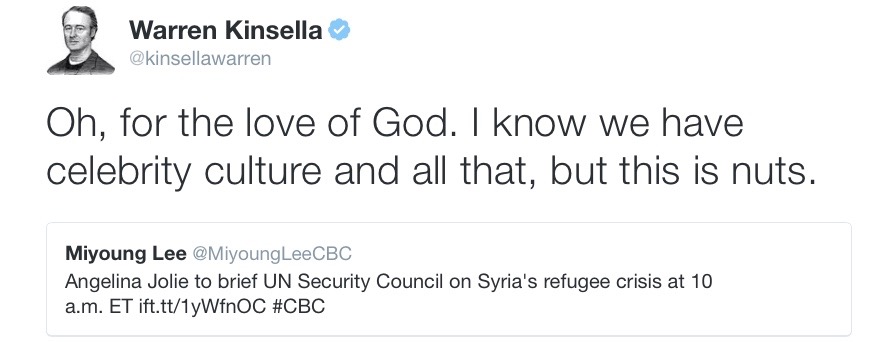Tim and Kathleen react to my suggestion that Trudeau will win next election
Pillow I threw at Tim Powers at IAFF conference
Strange guy in sunglasses photobombs tourist picture on Hill
Shame
The one responsible for the biggest abridgement of civil liberties in Toronto’s history – the one who defended carding non-white citizens.
Running for the Liberal Party of Canada. What a disgrace.
Wynne’s budget: two linkless points
There’s not much controversy surrounding it, at all, because:
- She said, if elected, she’d invest in transit and infrastructure, and this budget is aimed at giving effect to that; and
- She (and we) know that, to pay for the aforementioned, she needs to do some judicious cuts.
Voters get all of that stuff. They therefore know she’s on the right track. Steady as she goes.
And in other news, Justin Bieber has reportedly brokered a ceasefire with ISIS
The case of Oskar Groening
I have been following the prosecution of this SS Auschwitz guard closely. His blasé recitation of serial horrors isn’t noteworthy – he was indisputably a member of the Nazi killing machine, and his apparent indifference to genocide is almost predictable, notwithstanding his much-reported sophistry about “moral guilt.”
What I find surprising, instead, is the neutral – almost disinterested – tone that some reporters and editors have adopted in covering this trial. Here, then, are some truisms that I have referred to before, in a tautological trifecta:
- It is acceptable to take a position on notorious crimes.
- Notorious crimes like genocide and mass murder should be condemned.
- Condemning such notorious crimes doesn’t compromise one’s journalism, it enhances it.
The Holocaust, and the way in which it was carried out in places like Auschwitz, should not be reported on as mere allegations, as we would report on someone charged with shoplifting and appearing for the first time in provincial court. The Holocaust is no mere allegation. (Nor the Armenian genocide, which commenced 100 years ago today, and which gets referred to in similarly antiseptic reports.) By admitting he was there, facilitating genocide, Oskar Groening – though an old man, and no longer in uniform, and expressing regret – was a mass murderer like the rest of those bastards. And he deserved, and deserves, their fate.
Who’s going to win the next federal election?
Here’s what the CBC’s polling aggregator has to say:
I’m not sure I buy this theory: if the past six months have shown us anything, they’ve shown us that events can have a rather dramatic effect on voting intention.
What do you think, Dear Reader? CPC for the win, as CBC suggests? Or someone else?




